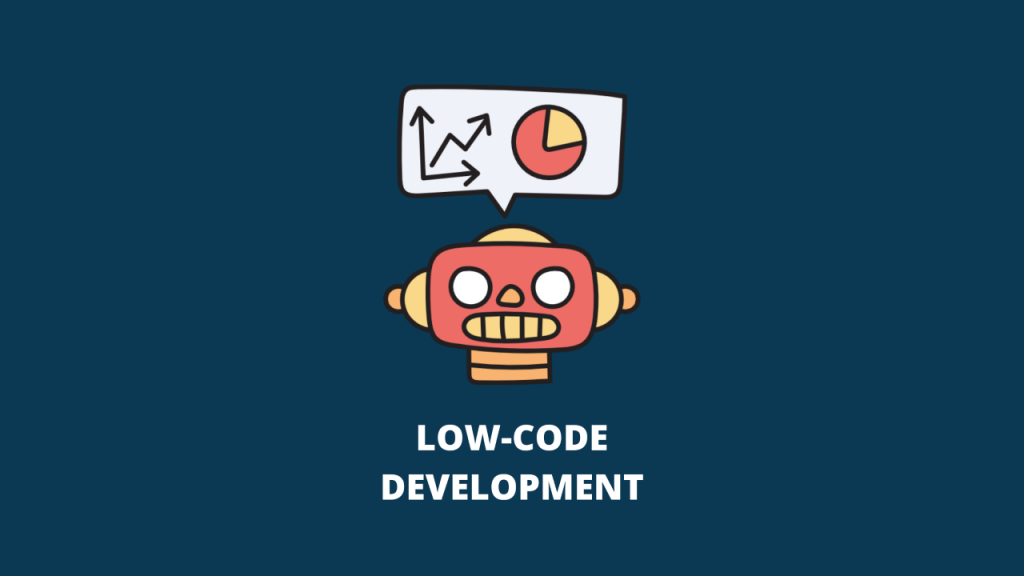
Did you know that Gartner predicts that by 2025, 70% of new applications developed by organizations will use low-code or no-code technologies, up from less than 25% in 2020? (Source: Gartner)
Low-code development platforms (LCDPs) are revolutionizing software development by allowing users to create applications with minimal coding through intuitive visual interfaces, drag-and-drop features, and pre-built templates.
For instance, companies like using low-code platforms to rapidly prototype and deploy new features, significantly speeding up their digital transformation processes.
As these platforms gain momentum, they are reshaping the job market and fundamentally altering the roles of developers.
This blog delves into the impact of low-code development on the job market, examines the evolving roles of developers, and explores how brands are using low-code solutions.
What is Low-Code Development?
Low-code development refers to platforms that provide a graphical interface for application development, reducing the need for extensive coding.
These platforms aim to make application development more accessible, allowing users with minimal technical knowledge to build functional apps quickly.
For professional developers, low-code tools offer a way to accelerate development cycles and streamline workflows.
Growth of Low-Code Development
The low-code development market is experiencing exponential growth. According to Gartner, by 2025, 70% of new applications developed by organizations will use low-code or no-code technologies, up from less than 25% in 2020.
- This surge is driven by the increasing need for businesses to adapt quickly to digital transformation, automate processes, and deliver solutions faster.
The Changing Role of Developers
While low-code development platforms are streamlining application creation, they are not replacing traditional developers. Instead, they are changing the nature of development work. Here’s how:
1. Focus on Complex Problems
Low-code platforms are excellent for creating simple, routine applications. However, complex projects that require advanced functionality, custom integrations, or intricate algorithms still need the expertise of professional developers.
For example, large-scale enterprise systems, such as those used by multinational corporations like IBM, require robust backend solutions and advanced security measures that go beyond what low-code platforms can offer.
2. Consultancy and Facilitation
Developers are increasingly taking on roles as consultants and facilitators. They guide business users in leveraging low-code platforms effectively, ensuring that applications are secure, scalable, and align with organizational goals.
For instance, companies like Deloitte and Accenture offer consulting services to help businesses implement and optimize low-code solutions, blending their development expertise with strategic advice.
3. Enhanced Collaboration
The rise of citizen developers—business professionals using low-code tools—means that developers must collaborate more closely with non-technical stakeholders. This shift encourages a more integrated approach to project development.
For example, Salesforce’s low-code platform, Salesforce Lightning, allows sales teams to build custom CRM solutions while working closely with IT departments to ensure alignment with business needs.
4. Rapid Prototyping and Innovation
Low-code platforms enable rapid prototyping and iteration, allowing developers to test and refine ideas quickly. This agility supports innovation within organizations.
For instance, companies like Toyota have used low-code platforms to prototype new features for their internal systems rapidly, facilitating faster decision-making and implementation.
Impact on the Job Market
The rise of low-code development has significant implications for the job market. Here’s how:
1. Growth of Citizen Developers
Low-code platforms empower non-technical employees to build applications, leading to the emergence of citizen developers.
- This trend can reduce the demand for developers focused on routine applications but creates opportunities for roles that bridge business and technology.
- For example, PepsiCo has utilized low-code platforms to enable its business units to develop their own applications, allowing IT staff to focus on more strategic projects.
2. Upskilling and Cross-Skilling
The shift towards low-code development is driving demand for employees with hybrid skills.
- Professionals who combine business knowledge with technical expertise will be highly sought after.
- For instance, marketing professionals who can build and customize marketing automation tools using low-code platforms will be in high demand as businesses seek to streamline their marketing efforts.
3. Job Creation in Maintenance and Customization
Despite the rise of low-code platforms, traditional development roles focused on maintaining and customizing applications will remain crucial.
- Developers will be needed to handle complex integrations, ensure security compliance, and optimize performance.
- For example, a low-code platform requires developers to manage integrations with legacy systems and customize solutions to meet enterprise-level requirements.
4. Emergence of Platform-Specific Roles
As low-code platforms proliferate, new job roles focused on managing and customizing specific platforms will emerge.
- Companies will need experts who understand the nuances of different low-code environments and can develop custom plugins or extensions.
- For instance, DewStudio, a popular low-code platform, has created roles who specialize in customizing and extending the platform’s capabilities.
5. Outsourcing and Automation
Low-code development may reduce the need for outsourcing routine development tasks but will drive demand for roles focused on advanced automation and AI solutions.
- Developers specializing in AI, machine learning, and complex system integrations will find new opportunities as businesses seek to enhance their automation capabilities.
- For example, companies like Google are investing in AI-driven solutions that complement low-code platforms, creating new opportunities for developers skilled in these technologies.
Challenges and Risks of Low-Code Development
While low-code platforms offer numerous benefits, they also present challenges that could influence job roles and market dynamics:
- Security and Compliance: Low-code applications may not always meet stringent security and compliance standards. Developers with expertise in security will be needed to ensure that applications are robust and adhere to regulatory requirements.
- Scalability: Many low-code solutions are designed for smaller-scale applications and may struggle with scalability. As businesses grow, they may need to transition from low-code solutions to custom-built applications
- Vendor Lock-In: Low-code platforms are often proprietary, leading to potential challenges if organizations need to switch platforms. Developers will play a key role in managing these transitions and mitigating vendor lock-in issues.
How Developers Can Adapt
To thrive in the evolving landscape of low-code development, developers should consider the following strategies:
- Learn Low-Code Platforms: Familiarize yourself with popular low-code platforms such as DewStudio Understanding these tools will enhance your versatility and open up new opportunities.
- For example, becoming certified in DewStudio can provide a competitive edge in the job market.
- Upskill in Architecture and Integration: Focus on mastering system architecture, cloud solutions, and API integrations—areas where low-code platforms may fall short.
- Developers with expertise in these domains will remain essential for handling complex requirements. For instance, expertise in cloud services like AWS or Azure will complement low-code development efforts.
- Use Low-Code for Rapid Development: Use low-code platforms to accelerate routine tasks and focus on more strategic, high-impact work.
- For example, you can use low-code tools to quickly prototype new features, allowing you to spend more time on innovative projects.
- Enhance Soft Skills: As collaboration with business users becomes more common, develop strong communication and teamwork skills.
- Effective collaboration with non-technical stakeholders will ensure better outcomes and smoother development processes.
Conclusion
Low-code development is transforming the software landscape, reducing the need for traditional coding while opening up new avenues for developers to tackle complex problems, offer strategic insights, and enhance collaboration with business units. Success in this evolving field hinges on adaptability.
Adapting new technologies, enhancing your skills, and leverage low-code tools to stay ahead. For cutting-edge low-code solutions and expert guidance, explore DewStudio today.



